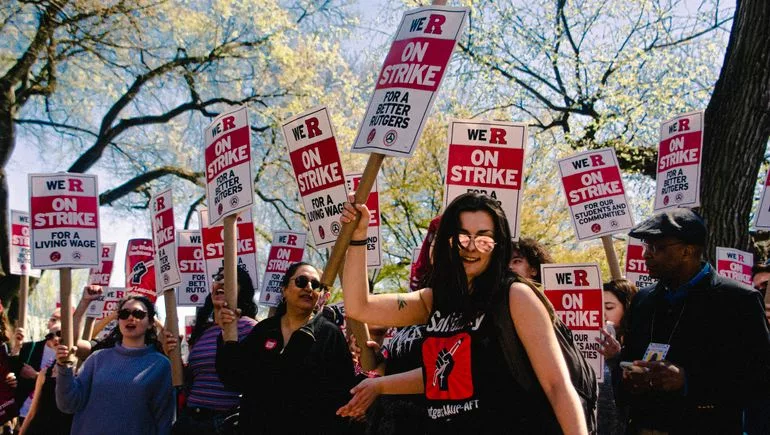[ad_1]
Two prominent faculty strikes at public universities wound down over the weekend. A five-day faculty walkout at Rutgers University, in New Jersey, ended Saturday as the three unions representing over 9,000 educators accepted a framework for new contracts.
And the faculty union at Chicago State University Sunday ended a 10-day strike and reached a tentative agreement after almost a year of working without a contract.
The Rutgers strike, in addition to being notable as the first in the university’s over 250-year history, drew attention for uniting faculty members of all types.
The Rutgers American Association of University Professors-American Federation of Teachers represents full-time faculty, graduate students, postdoctoral workers and counselors, while the Rutgers Adjunct Faculty Union represents part-time lecturers and adjuncts. Members of the AAUP-Biomedical and Health Sciences of New Jersey are faculty for Rutgers’ health sciences programs.
The joint labor effort secured several wins for a majority of the striking faculty. Before the strike, the university’s administration and unions sat far apart on issues like salary increases and pathways to tenure.
The new framework includes “profound victories” for employees, according to union leaders. Among those are pay increases, more job security for adjuncts and graduate students workers, and more faculty control over teaching conditions like scheduling.
Rutgers AAUP-AFT members will see salary increases of at least 14% by July 1, 2025, the university said. Part-time lecturers will get a 43.8% raise in their per-credit salary rate over the next four years, along with significantly more job security.
During the same period, the minimum salary for postdoctoral fellows and associates will go up by 27.9%, and graduate assistants’ salaries will rise to $40,000.
“The agreements secured in this framework are a testament to all the workers, students, and community members who organized, talked to their colleagues, walked the picket lines, and marched in New Brunswick, Newark, and Camden,” Rebecca Givan, president of Rutgers AAUP-AFT, said in a statement Saturday.
Givan also thanked New Jersey Gov. Phil Murphy for bringing the bargaining process to the state capitol, which she said got “far more movement from the administration in a matter of days than had taken place in months.”
Murphy praised the strike’s resolution.
“This fair and amicable conclusion respects the interests of many different stakeholders, upholds New Jersey’s values, and puts an end to a standoff that was disruptive to our educators and students alike,” Murphy said in a statement Saturday.
But there are still outstanding contract issues for the roughly 1,300 union members in AAUP-BHSNJ, according to union leaders.
“The university is still ignoring job security and leave issues for our health science faculty,” Dr. Catherine Monteleone, president of AAUP-BHSNJ said in a statement Saturday. “As members of the #OneFaculty campaign, it is important that we keep the pressure on while we finish this contract.”
Union and university leaders will negotiate the remaining issues over the coming days.
Classes resume at Chicago State
Meanwhile, the union representing Chicago State faculty and staff — the University Professionals of Illinois Local 4100 — ended its strike Sunday. The walkout began April 3 after almost a year of contract negotiations.
“The University has bargained in good faith, but there are limits on the University’s flexibility. The University cannot agree to a contract that is not financially sustainable and does not position it for long-term success,” said a university FAQ about the bargaining process.
The union had proposed a 6.5% salary increase in the first year of a four-year contract. In return, Chicago State offered faculty a 3% raise and a $1,000 lump sum payment per faculty member, according to the union.
Both parties found a way to bridge the gap this weekend, however.
“The tentative agreement addresses a range of considerations including wages, workload and parental leave and accomplishes the goals of both parties to reach an agreement that recognizes the valuable contributions of the faculty and academic support professionals with appropriate consideration for the fiscal position of the University,” a Chicago State spokesperson said in an email Monday.
The details of the four-year agreement will not be publicly shared until union members have voted, representatives told WBEZ Chicago. A date for that vote has not been set, the news outlet said.
Both the Rutgers and Chicago State unions still must ratify their respective agreements. But faculty returned to classes at both colleges Monday.
At Rutgers, the tentative ceasefire is good news, according to university President Jonathan Holloway.
“Closure on this framework will allow our 67,000 students to resume their studies and pursue their academic degrees,” Holloway said in an open community letter Saturday. “Nothing we do is as important as living up to the expectations that our students and their families have of us to be fully supportive of them and nurturing of their academic ambitions and dreams.”
[ad_2]
Source link
To find out about the courses we have on offer: Click Here
Join the Course: Click Here


